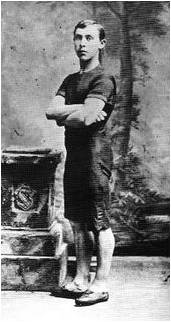Banned For Life ... for finishing second?
 From 1880 until the late 1900's, the Amateur Athletic Association were the controlling body of
athletics in England. One of their pet hates was the possibility of gambling on athletics:
up to the late 1970's, AAA Laws required organisers of meetings to put up notices
stating "Betting Strictly Prohibited". They took vigorous action against those suspected of
involvement with betting: their most prominent victim was William Snook.
From 1880 until the late 1900's, the Amateur Athletic Association were the controlling body of
athletics in England. One of their pet hates was the possibility of gambling on athletics:
up to the late 1970's, AAA Laws required organisers of meetings to put up notices
stating "Betting Strictly Prohibited". They took vigorous action against those suspected of
involvement with betting: their most prominent victim was William Snook.
- William Snook (1861-1916) came from Shropshire, but joined the Moseley club in Birmingham, later
switching to Birchfield Harriers. At first a sprinter, he turned to distance running with considerable
success: he won four AAA Track titles in 1885. So when the National Cross-Country Championships came round
in March 1886, he was widely expected to win. But he came second ...
- Had it just been one of those off-form days that every sportsperson has? The AAA thought otherwise: they
accused him of "roping": deliberately losing the race for the benefit of bookmakers or gamblers.
William Snook was one of those sportspeople with a talent for upsetting sporting authorities (taking
part in unrecognised meetings, associating with professionals, that sort of thing). But this does not
excuse the AAA's actions: they had no proof of any involvement William Snook might have had with
gambling but, in a process falling well short of present-day standards of judicial fairness, banned
him from amateur athletics for life.
- Snook's only outlet for his talent was as a professional athlete: after three years he left the sport.
His later life was far from happy: after a spell in France he returned to Britain in poverty. He died
in 1916: Birchfield Harriers heard of his plight too late to be of any real help to him, but they did
meet the expenses of his funeral.
 From 1880 until the late 1900's, the Amateur Athletic Association were the controlling body of
athletics in England. One of their pet hates was the possibility of gambling on athletics:
up to the late 1970's, AAA Laws required organisers of meetings to put up notices
stating "Betting Strictly Prohibited". They took vigorous action against those suspected of
involvement with betting: their most prominent victim was William Snook.
From 1880 until the late 1900's, the Amateur Athletic Association were the controlling body of
athletics in England. One of their pet hates was the possibility of gambling on athletics:
up to the late 1970's, AAA Laws required organisers of meetings to put up notices
stating "Betting Strictly Prohibited". They took vigorous action against those suspected of
involvement with betting: their most prominent victim was William Snook.